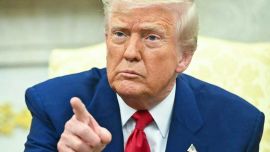Peru's president dissolved Congress and called for fresh elections Monday, prompting a vote by lawmakers to suspend him, deepening a long-running institutional crisis.
The announcement by President Martín Vizcarra came after he warned Congress he would dissolve the body if it continued to block a raft of anti-corruption reforms and changes to the way judges are appointed to the country's Supreme Court.
Vizcarra called new parliamentary elections for January 26, according to a decree published in the Official Gazette.
Renegade lawmakers defied the chief of state, staying in their seats late into the night and even voting to suspend him from office and appoint a vice president who recently broke ranks in his place.
But thousands of people took to the streets in the capital waving Peruvian flags and celebrating Vizcarra's decision in a country where nearly every living president has been implicated in the Odebrecht graft scandal.
"We are making history that will be remembered by future generations," Vizcarra said in a national address Monday evening. "And when they do, I hope they understand the magnitude of this fight that we are in today against an endemic evil that has caused much harm to our country."
The stunning turn could spell new instability as Peru grapples with the fallout of the Odebrecht probe, plummeting faith in public institutions and an inexperienced president struggling to govern.
'Moral Incapacity'
Shortly after his televised statement, 86 of Congress' 130 members voted to suspend Vizcarra for one year on the grounds of "moral incapacity" and nominated Vice-President Mercedes Aráoz as acting head of state.
Opposition leaders denounced the move as the work of a "dictator," refusing to leave congress and instead approving a resolution to suspend Vizcarra for "breaking the constitutional order." Minutes later they swore in Aráoz, the vice-president who recently broke with Vizcarra over his push to hold early elections next year.
The acts likely carry only symbolic weight since Congress is considered vacated.
"I know many Peruvians are upset," said Aráoz, who was greeted by applauding lawmakers singing the national anthem. "I share that anger but the solution for a crisis like this is not irresponsible gestures."
The chamber will meet Friday to consider a motion to dismiss the president, House Speaker Pedro Olaechea said.
"We are facing a coup d'état," opposition legislator Jorge del Castillo said of Vizcarra's move. "I hope the Armed Forces and the Police will stay out of this charade."
But the chiefs of the Police and Army "reaffirmed their full support for the constitutional order" and Vizcarra at the presidential palace in Lima, the presidency said on Twitter, posting a photo of the meeting.
Supporters of the move to dissolve Congress also took to the streets across Peru, with one demonstration in Lima drawing around 2,000 people.
Hundreds gathered outside Congress honking horns, chanting and carrying signs with phrases like "Get out, corrupt politicians!" Others tried to force their way into the legislature to get lawmakers out but were driven back by police with tear gas.
"Peruvians will not shed many tears," said Steven Levitsky, a Harvard University political scientist who has extensively studied the nation.
Anti-graft drive
Vizcarra – whose anti-graft drive has won him widespread popularity – has repeatedly clashed with Congress, which is dominated by the Popular Force party of Keiko Fujimori.
Fujimori is the eldest daughter of disgraced former president Alberto Fujimori and is herself in prison awaiting trial after being accused of accepting US$1.2 million in illicit party funding from Brazilian construction giant Odebrecht for her 2011 presidential campaign.
The Supreme Courty is currently debating whether to free opposition leader Keiko – once Peru's most popular politician – from pre-trial detention.
Odebrecht, the Brazilian construction giant that has admitted to dolling out millions of dollars to politicians around Latin America in exchange for lucrative public works contracts, has admitted paying at least US$29 million in bribes to Peruvian officials since 2004.
Three former presidents, including Vizcarra's predecessor Pedro Pablo Kuczynski, are also being investigated over Odebrecht while a fourth, Alan García, committed suicide in April after police arrived at his house to arrest him for money-laundering.
Vizcarra, once vice-president, rose to the presidency last year after Kuczynski resigned following revelations that his private consulting firm had received undisclosed payments from Odebrecht,.
Though with little political expertise on his resume, Vizcarra rose in popularity as he championed anti-corruption initiatives. But he struggled to push legislation through Congress, instead repeatedly utilising a "vote of confidence" through which he could threaten to dissolve the legislature if lawmakers didn't approve his proposals.
The mechanism is aimed at resolving conflicts between the executive and legislative branch and allows the president to shut down Congress if lawmakers reject two such votes. Congress rejected a previous vote of confidence during Kuczynski's administration.
Most recently, Vizcarra chastised lawmakers for rushing to a vote on replacing six of the seven magistrates on the Constitutional Tribunal. The court is expected to decide several important cases in the months ahead, including a habeas corpus request to free Fujimori, who is being held as prosecutors investigate her for allegedly laundering money from Odebrecht.
Though the terms for all six magistrates had expired, Vizcarra, legal observers and human rights organizations criticized the congressional action for its speed and lack of transparency. The newspaper El Comercio reported Monday that six of the candidates up for consideration are facing potential criminal or civil charges for offences including kidnapping, extortion and sex abuse.
Peru's judicial system is notoriously corrupt, with judges caught on wiretaps negotiating deals on sentences for serious crimes.
- TIMES/AFP/AP


























Comments